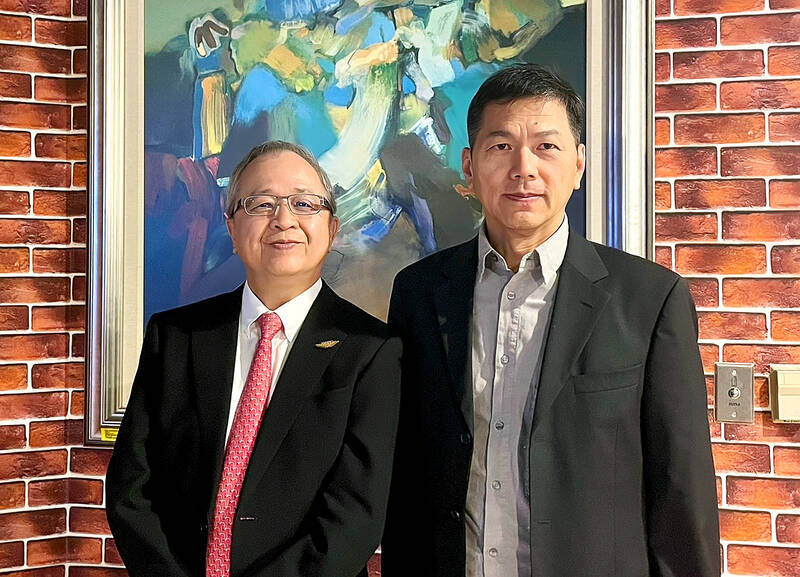Industrial computer maker Flytech Technology Co (飛捷科技) yesterday said it would continue to enhance its gross margin amid the impacts of the New Taiwan dollar’s appreciation and US tariffs.
The company would continue to boost operational resilience through artificial intelligence (AI) integration, in-house module development and high value-added products, Flytech chairman Lam Tai-seng (林大成) told reporters after its annual shareholders’ meeting in Taipei.
Flytech’s products mainly comprise smart point-of-sale systems, touch-panel PCs, mobile terminals, self-service kiosks, embedded computers and unified endpoint management software, the company’s Web site showed.

Photo: Fang Wei-chieh, Taipei Times
As Flytech exports products under free-on-board terms, the higher US tariffs would be borne by clients, who have not asked the company to absorb the costs, Lam said.
However, the higher tariffs could still affect some product prices and plans, he said.
Regarding the sharp appreciation of the NT dollar against the US currency, Lam said it is estimated to cut the company’s gross margin by 4.5 to 5 percentage points, given that about 40 percent of its products are priced in US dollars.
The exchange rate fluctuations are expected to affect the company’s sales performance, but it has made significant efforts in product design to help maintain its gross margin, he said.
First-quarter gross margin stood at 44.62 percent, up from 42.99 percent a year earlier, while revenue grew 34.31 percent year-on-year to NT$1.36 billion (US$45.4 million), company data showed.
The main driver of revenue growth was its customized services, Lam said, adding that the business outlook in the second half of the year would be better than the first half due to stable demand.
Asked about the company’s plans to build new plants, Lam said it would depend on how tariff policies develop.
Flytech has no plans to set up a facility in the US due to high costs and an incomplete supply chain, he said.
However, the company is assessing the possibility of setting up factories in Vietnam or Thailand as it aims to diversify risks and meet demand from regional clients, he added.
North and South America accounted for 52 percent of Flytech’s revenue last year, followed by 38 percent from Europe, the Middle East and Africa, and 10 percent from the Asia-Pacific region.
Shareholders yesterday approved the company’s proposal to distribute a cash dividend of NT$6 per share, the highest since 2017.
Revenue last year grew 32.04 percent year-on-year to NT$4.61 billion, and net profit reached NT$958.76 million, up 102.82 percent year-on-year. Earnings per share were NT$6.93.

Vincent Wei led fellow Singaporean farmers around an empty Malaysian plot, laying out plans for a greenhouse and rows of leafy vegetables. What he pitched was not just space for crops, but a lifeline for growers struggling to make ends meet in a city-state with high prices and little vacant land. The future agriculture hub is part of a joint special economic zone launched last year by the two neighbors, expected to cost US$123 million and produce 10,000 tonnes of fresh produce annually. It is attracting Singaporean farmers with promises of cheaper land, labor and energy just over the border.

US actor Matthew McConaughey has filed recordings of his image and voice with US patent authorities to protect them from unauthorized usage by artificial intelligence (AI) platforms, a representative said earlier this week. Several video clips and audio recordings were registered by the commercial arm of the Just Keep Livin’ Foundation, a non-profit created by the Oscar-winning actor and his wife, Camila, according to the US Patent and Trademark Office database. Many artists are increasingly concerned about the uncontrolled use of their image via generative AI since the rollout of ChatGPT and other AI-powered tools. Several US states have adopted

A proposed billionaires’ tax in California has ignited a political uproar in Silicon Valley, with tech titans threatening to leave the state while California Governor Gavin Newsom of the Democratic Party maneuvers to defeat a levy that he fears would lead to an exodus of wealth. A technology mecca, California has more billionaires than any other US state — a few hundred, by some estimates. About half its personal income tax revenue, a financial backbone in the nearly US$350 billion budget, comes from the top 1 percent of earners. A large healthcare union is attempting to place a proposal before

Nvidia Corp’s GB300 platform is expected to account for 70 to 80 percent of global artificial intelligence (AI) server rack shipments this year, while adoption of its next-generation Vera Rubin 200 platform is to gradually gain momentum after the third quarter of the year, TrendForce Corp (集邦科技) said. Servers based on Nvidia’s GB300 chips entered mass production last quarter and they are expected to become the mainstay models for Taiwanese server manufacturers this year, Trendforce analyst Frank Kung (龔明德) said in an interview. This year is expected to be a breakout year for AI servers based on a variety of chips, as